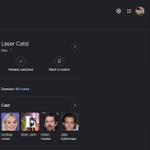@TheRealPomax @humphd To be fair, most minimal modern websites probably won’t need a SQLite database. 😅 But I hear you!
@humphd @TheRealPomax Doing it in Wasm land has the advantage that it’s easier to update when security issues are detected, unlike with baked-in sqlite engines in browsers. The Web SQL spec literally required a certain sqlite version. Wasm allows for fu
@AnaestheticsApp The library uses the OPFS, the origin private file system, and requires a web worker context.
@basketball_gm Quota-managed storage mechanisms are: cache storage, IDB, service worker, media license, OPFS, Web SQL (the last is of course soon history).
@basketball_gm Okay, scrap that. When it hits your origin, _all_ quota-managed storage mechanisms get purged. The way if it hits your origin gets decided is by looking at all quota-managed storage mechanisms of all origins and then purging by LRU.
RT @ChromiumDev: Chrome 110 Beta is now available, find out what’s included in the release post https://t.co/Z0V8IFDaKW
@basketball_gm My current understanding is that the data would be persisted and not purged under memory pressure. I will check back with engineering for an authoritative answer.
@pesterhazy @ChromiumDev Here’s some more documentation on the file locking behavior: https://t.co/dcoSYTlOF5.
No. 1 on Hacker News (https://t.co/1Vkj4TAPgq) with my article “SQLite Wasm in the browser backed by the Origin Private File System”: https://t.co/2275cV00ar. Doing DevRel on Project Fugu 🡠is such an incredible joy and honor!

@max77sabers It’s dark here, too. These are my settings. pic.twitter.com/UkVzES2vHt